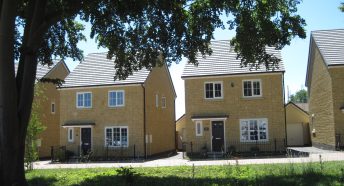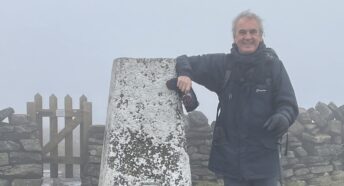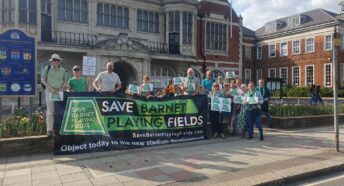Dr David Neden: a tribute to a CPRE champion

Dr David Neden, once one of the most active members of the Thanet district group of CPRE Kent and a co-founder of the Pegwell & District Association, has died.
His passing, on Friday, July 20, means east Kent bids farewell to one of the most passionate and determined campaigners for the natural environment in our area.
Dr Neden was born in Carshalton (then Surrey, now London) in January 1929 and went to school in nearby Sutton, gaining Higher Certificates in zoology, botany, physics and chemistry before heading to University College London and then University College Hospital medical school.
Eighteen months of house jobs at medical school preceded two years’ National Service, from 1954-55, which he saw out as a doctor in the Royal Navy.
Two more hospital jobs followed before Dr Neden became a general practice trainee in Middlesex. Just a few months later, however, in late 1957, he took a job as a GP at the Grange Road surgery in Ramsgate, where he was to stay until retirement in 2005.
Moving with him to Thanet was wife Irene, the pair having married during Dr Neden’s spell in Middlesex; they had met during his time at medical school.
Settled happily in Ramsgate, the couple brought up their children Sarah, John (himself a GP in Ramsgate today) and Andrew.
Although his last home was in Grange Road, Dr Neden had lived for many years on the West Cliff with Irene, who passed away in 2009.
Dr Neden had enjoyed a strong Christian faith since his school days and was a regular at Christ Church Ramsgate and a trustee of the Sailors Church by the harbour.
Moving to Thanet sparked an interest in the natural environment and this formed the bedrock of his involvement in the creation of the Pegwell & District Association in April 1987.
This had been prompted by a London developer’s plans to run a railway line through the Pegwell cliffs, along the West Cliff foreshore to Ramsgate harbour.
The battle against the scheme was won, although eventually, after further proposals and public inquiries, a publicly-funded tunnel and road to the harbour were built.
Reflecting many years later on the outcome, Dr Neden had said: “The amazing irony was that the very day the road opened, the ferry company Sally, which was operating out of Ramsgate, went bust.”
He also drew a typically positive outcome from what had happened: “The tunnel, I suppose, was the best of a bad job.”
Both Dr Neden (he only stepped down from the committee last year) and Irene carried on their work for the Pegwell association, while they were active members of the Thanet district group of CPRE Kent.
The Pegwell association flourished to the point that at one time it had some 230 members on board, with a healthy social scene that included parties and a range of outings to places outside the area.
Asked what he considered to be the association’s greatest achievement, Dr Neden had said: “We added to the opposition to unseemly development and have continued to be alert. And we have made friends out of it.”
- Dr David Arthur John Neden died on Friday, July 20, 2018. He leaves daughter Sarah and sons John and Andrew. There will be a thanksgiving service at 11am on Thursday, August 30, at Christ Church Ramsgate. It is asked that donations in lieu of flowers go to Pilgrims Hospices c/o HR Palmer, Funeral Directors, 30 Hardres Street, Ramsgate CT11 8QF.
- A number of important documents have yet to emerge. For example, a rigorous transport plan and a finalised air-quality assessment. The latter is critical given that allocations at Teynham will feed extra traffic into AQMAs.
- There seems to be no coherent plan for infrastructure delivery – a key component of the plan given the allocations being proposed near the already crowded Junction 7.
- There seems to have been little or no cooperation with neighbouring boroughs or even parish councils within Swale itself.
The removal of a second consultation might have been understandable if this final version of the plan were similar to that being talked about at the beginning of the consultation process. It is, however, radically different in the following ways:
- There has been a major shift in the balance of housing allocations, away from the west of the borough over to the east, especially around the historic town of Faversham. This is a move that raises many concerns.
- A new large allocation, with accompanying A2 bypass, has appeared around Teynham and Lynsted, to which we are objecting.
- Housing allocations in the AONB around Neames Forstal that were judged “unsuitable” by the council’s own officers have now appeared as part of the housing numbers.
- Most of the housing allocations being proposed are on greenfield sites, many of them on Grade 1 agricultural land – a point to which we are strongly objecting.
Concerns about the rush to submit the plan
The haste with which the plan is being prepared is especially worrying given the concentration of housing in Faversham. If the town is to take a large amount of new housing, it is imperative that the policies concerning the area are carefully worked out to preserve, as far as possible, the unique nature of the town. The rush to submit the plan is likely to prove detrimental.
As Swale does not have a five-year land housing supply, it is open to speculative development proposals, many of which would run counter to the ideas contained in the current plan. Some are already appearing. This is a common situation, and one that, doubtless, is a reason behind Swale’s haste.
Our overriding fear, however, is that this emphasis on haste is ultimately going to prove counterproductive. This is because it is our view that the plan, in its current form, is unlikely to pass independent examination. We are urging Swale to listen to and act upon the comments being made about the plan and to return the plan to the council with appropriate modifications before submitting it to the Secretary of State.
Essentially, this means treating the current consultation not as the final one but as the ‘lost’ second consultation.
The consultation ends on Friday 30 April and we strongly urge residents to make their opinions known if they have not already done so.
Further information








